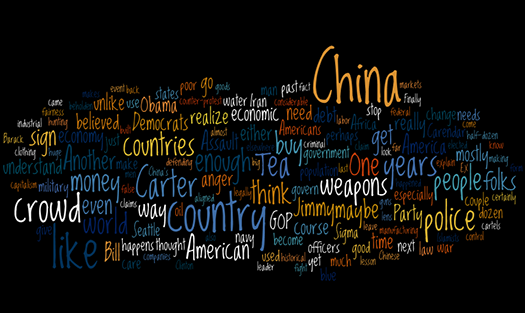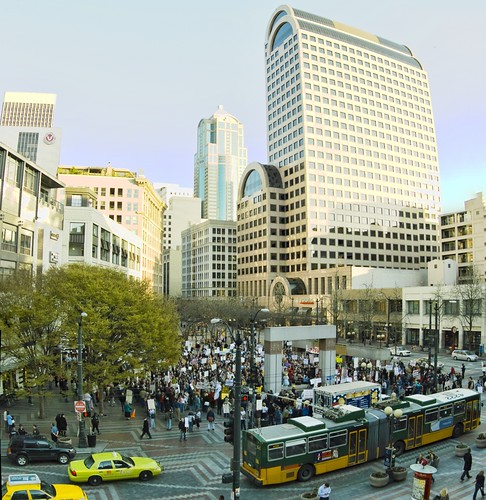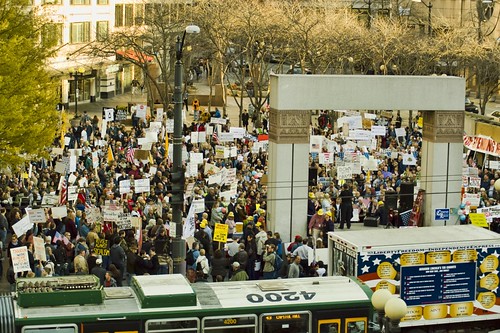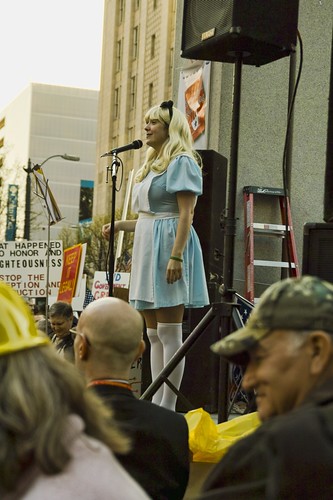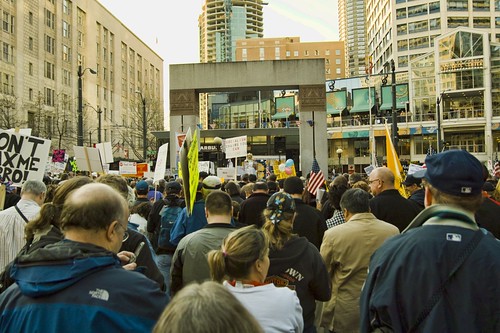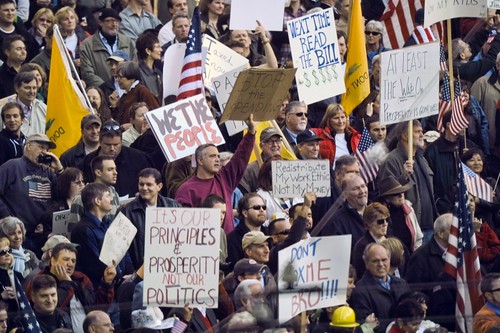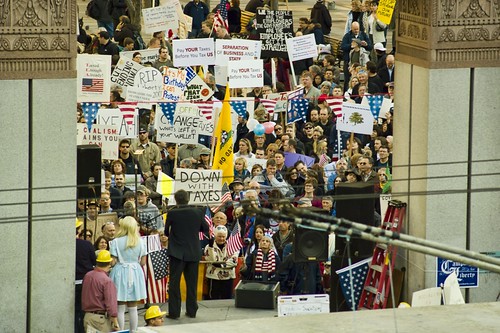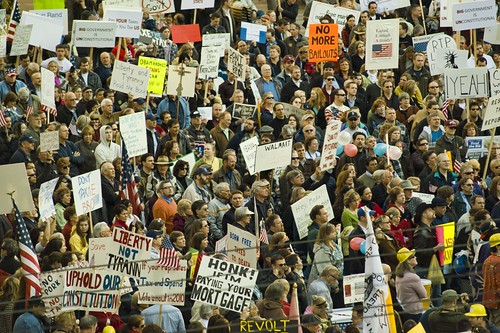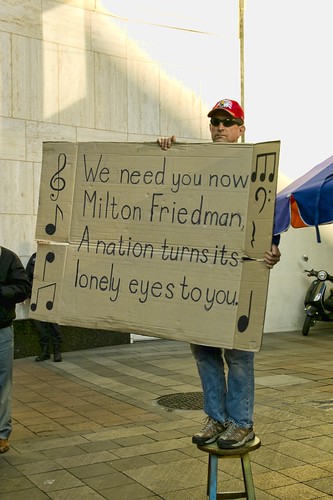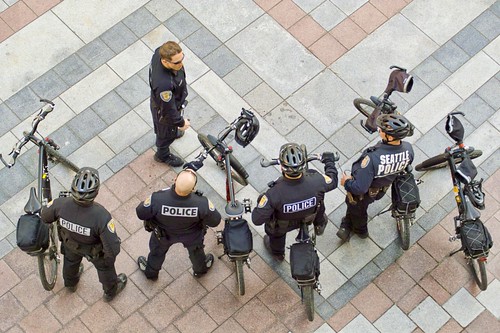After passing the House of Representatives last week without a single Republican 'aye' (and 11 'nays'
from Democrats), the
American Recovery and Reinvestment Act of 2009 is on the way to the Senate for approval.
However, there are already signs that support for the stimulus bill is waning,
particularly among Democrats. And no wonder, because as the public learns more about what is actually in the bill,
public support has dropped to 42%, or to put it another way, the majority of the public is against the stimulus bill in its current form while expecting it to be enacted.
The lack of public support for the stimulus bill, which turns out to be a
$900 billion funding package for a hodge-podge of Democrat-supported pet programs, most of which have very little to do with economic stimulus and a lot to do with rewarding Democrat supporters and entrenching Democrat control of the federal government, has grown as more of the bill's provisions have been publicized. The American public isn't so stupid as to believe that funding abortions overseas, or providing billions of dollars to Democrat-supporting activist groups such as ACORN, or spending hundreds of millions of dollars on condoms, will pull us out of the deep recession we find ourselves in. Nor do they believe that
a spending bill that spends less than half of the appropriated money in the
next two years will have a significant impact on the economy. In short, the public is starting to see through the smoke and hand-waving, and that is not good news for Obama or the Democrat Congress... which brings us to why support from Congressional Republicans is wanted.
Obama is not stupid. He knows that he owns the economy now and voters will hold him and the Democrats responsible if things haven't turned around by 2010, and if he doesn't get a full recovery by the end of his first term he will not be re-elected. I'm sure that Obama would prefer that Congressional Democrats had written a cleaner bill. And, I'm also sure that Obama is deathly afraid the stimulus bill won't work... and without Republican support he will own that failure. You see, if Republicans also vote for the bill, then its failure can't be used against the Democrats. This is why Obama went to Capital Hill last week, not to prove his ability at generating 'bipartisanship' but to get the needed political cover for this mess of a bill. It didn't happen. And, Obama needed that cover because the stimulus bill is about everything except stimulating the economy. It's not going to work.
Here's why: the bill is predicated on the assumption that government spending is a net positive, that each dollar spent by the federal government results in more than a dollar of GDP growth. In other words, there's a multiplier effect.
Obama's economic advisors are stating that the multiplier is 1.6 or above, meaning that each dollar spent will create $1.60 in additional spending.
Other economists aren't so sure, arguing that the multiplier may at best be 1.0 and most likely it will be even less, meaning that the stimulus bill will drive us even deeper into recession as it takes money out of the economy that would otherwise be used by the public for investments and spending. Who is right? It seems obvious that, if deficit spending would prevent a recession, then we would have a booming economy given that the federal government has been spending money like a drunken sailor. No, the result of this pork bill will be another $1 trillion added to the national debt, massive inflation as the money supply (the amount of cash in circulation at a given time) is almost doubled, and a devastating impact on the national economy as the country spends several decades paying this money off. Think about it: how can the government boost the economy when the government is taking money from the public and then passing it back out?
This is why many economists are in favor of an immediate payroll tax reduction; the money stays in the hands of the public who will pay down debt and buy consumer goods with it,
boosting the economy and raising the tax revenues. So why are the Democrats opposed to this program, which will have no administrative costs, and has repeatedly been proven to have a large multiplier effect? Perhaps because they vociferously opposed the Bush 2003 tax cuts which caused the economy to boom, just as the 1983 Reagan tax cuts caused the economy to boom... and perhaps because once the public gets used to having more money in their paycheck it will be politically difficult, if not impossible, to raise taxes. The argument reflects what's wrong with American politics in a nutshell: the majority party can't do what works because they've opposed it before solely for political reasons, and they don't have the courage to admit they were wrong.
Surprising everyone, the Republicans stood firm on principle (and good politics) and told the Democrats to take a hike. Obama's "I won" comment, and Speaker Pelosi's deliberate exclusion of Republican input, didn't help, but really, what was the upside to supporting the bill? If it passes and it works, Democrats will get all of the credit, and the Democrats don't need a single Republican vote in either house to pass it. If it passes, and fails, Republican support means it's off the table as a campaign topic. However, since there was no Republican support, the onus is on the Democrats and many in Congress will live or die, electorally speaking, on whether the American public views the stimulus bill as a success or failure. Unfortunately for the country, the Democrats have chosen to write and pass a bill that doesn't address the problem.
Now, the stops are all out. The
Democrat PACs are gearing up to intimidate Republican senators from blue-leaning states, and you better believe that Obama and his political advisors are behind it. They also know that several Democrat senators from red-leaning states are very worried about political survival if they vote for the stimulus bill. If Obama can't get 50 votes in the Senate, he is in for a very rough four years. Even it the bill passes, if he can't get at least a half-dozen Republican votes, then the Democrats will own the bill... and woe betide them if it fails.
You see, the goal here was to use the recession and the fear-mongering that the press has been generating around it to ram through three decades of Democrat pet programs, several of which would aid Democrat support groups and help to ensure electoral success for the next several decades. This was never about stimulating the economy, it was about building an impregnable Democrat majority, with the help of the Republicans. But the Democrats were too greedy, and the plan is unraveling. I wonder if we're going to look back in four years, after what seemed like a repeat of the Carter Administration, and see that it all started to fall apart these first few weeks.




